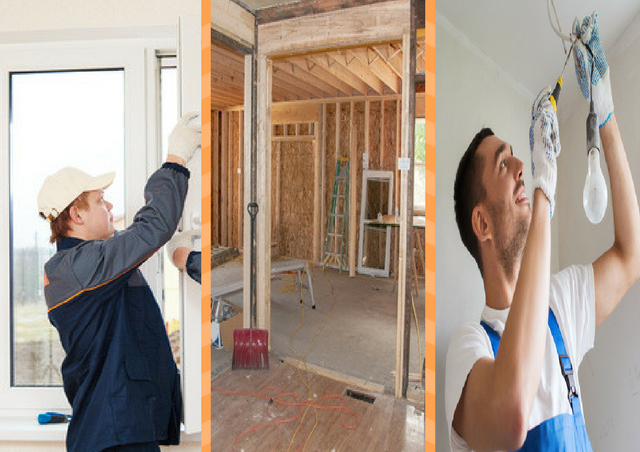Birds are calling out much more these days, the sun is shining through the still-crisp air, and summer gatherings are right around the corner. If you’re a homeowner, the seasonal changes could spark thoughts about upgrading things on your property, too.
Where to Start With Your Home Improvement Project

Wow, do you have plenty of home improvement projects to choose from – room additions, bathroom remodels, kitchen renovations, basement refinishing, and many others. If it’s your first time, choosing a home improvement contractor can get confusing.
Knowing the vocabulary for the work you need is crucial to successful communication with a potential contractor or service. So let’s break down how to pick the best contractor for the job… starting with an important bit of background knowledge.
2 Key Terms: Renovation vs. Remodel

Some people use the construction terms renovation and remodel interchangeably, but there is definitely a difference when it comes to modifying your home:
- Renovation- making minor updates or restorations to an existing structure; superficially reviving or repairing a space to be more attractive (think of repainting or refinishing surfaces, replacing or adding fixtures, etc.)
- Remodel- drastic changes to any functions, design, layout in a space; includes modifications like room or structural additions, transforming or altering walls, anything requiring plumbing or gas/electrical changes, and the like.
Home Remodeling: What You Need to Know

Categories of Remodeling
There are also different categories of remodeling that usually determine costs and value. Major additions and alterations are typically valued at $25,000 or more. Minor additions & alterations include jobs valued at less than $25,000. Lastly, the categorical costs for maintenance and repairs can vary depending on the work needed.
Regulations & Compliance

So what type of home improvement projects require permits? When you need to remodel, there are often municipal regulations for certain types of invasive construction. Some examples include:
- Adding windows
- Roof, electric/gas, septic or plumbing work
- Demolitions
- Changing a water heater
- Kitchen or bathroom remodels
Although a small fee is usually charged for permits, getting them isn’t something you want to shrug off even if you never plan on selling your home. You never know what could happen in the future, and the consequences could be severe if needed permits are ignored.
Hiring a licensed contractor can ease the hassle of handling the permit process, but since rules can change it’s ultimately your responsibility to know about any necessary permits. A quick search for “building permits” on your city government’s website will turn up exactly what you need.
Determining Work & Materials

Once you know what kind of renovation or remodeling you want completed, figuring out the necessary materials is important to your budget. You can either do the research on your own and discuss recommendations with a contractor, or let the contractor handle it completely.
According to George Holland of Holland Home Improvement Contractors in Sicklerville, New Jersey, finding reasonably-priced materials is where many homeowners fail to save money. “A contractor will consult you on your budget if you’re unsure of what you want, but be aware they may also suggest more expensive materials to make more money,” he explains.
“Expensive materials will equal more money spent. You can save money by finding deals or buying less expensive materials.” -George Holland, CEO, Holland Home Improvement Contractors, LLC
Not sure where to buy home improvement supplies or how they will impact your budget? Holland cites Homewyse.com as a fantastic resource to use to “check price references and do your own research to find out approximate potential prices and reduce sticker shock.” The site will give you an idea of material, installation and maintenance costs for home improvement projects. HomeAdvisor.com is another site that will provide project estimates based on local and national data.
Choosing the Right Contractor: What to Consider

As for finding the perfect contractor for the job, Holland suggests keeping the following things in mind:
- Ratings & Reviews
- Consumer reviews for remodeling or renovation contractors are a great way to gauge a business’ reputation. Since some ratings from the company’s website may be inflated (by asking only happy customers to review), it’s important to look at multiple sources for legitimate praise and consumer complaints.
- Try third-party sites like Google Business pages, AngiesList.com, the Better Business Bureau, or Yelp.com. You can also request advice from friends, neighbors or relatives who have personal experience using a service.
- Licensing
- Does the home improvement contractor have a license for construction? After quality service, Holland cites this as the most important consideration for homeowners. Search the business name or license number of any prospective contractor on your state’s licensing and regulation website in order to check.
- Insurance
- How important is it for a home improvement contractor to be insured? Holland gives this example,
- “Say you want to have some laminate floors installed. John the handyman does great work and has cheap prices. But there’s two things you have to remember:
- He’s probably not insured (although some handymen are), so IF a major problem occurs and he doesn’t have the money himself to cover it, you’re just out of luck.
- Most flooring companies won’t honor their warranties if their floors aren’t installed by a licensed contractor or someone certified to install their floors. Just something to think about when you want to get your next home improvement project done.”
Go Forth & Build!
By now you should at least have a good idea of the type of project you want to start, understanding the value (especially if a move is in your foreseeable future), and how to find a reputable contractor.
Of course, you could always do it yourself, but we don’t recommend going all HGTV on your bathroom unless you know what you’re doing!

 7 Days of Fantastic Holiday Savings [INFOGRAPHIC]
7 Days of Fantastic Holiday Savings [INFOGRAPHIC] 10 Quotes to Revive Your Willpower for the New Year
10 Quotes to Revive Your Willpower for the New Year 5 Incredibly Wise Ways to Use Your Tax Refund
5 Incredibly Wise Ways to Use Your Tax Refund
